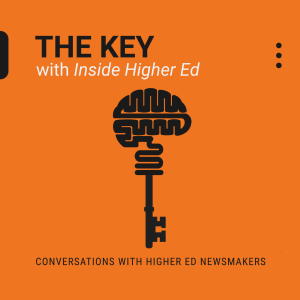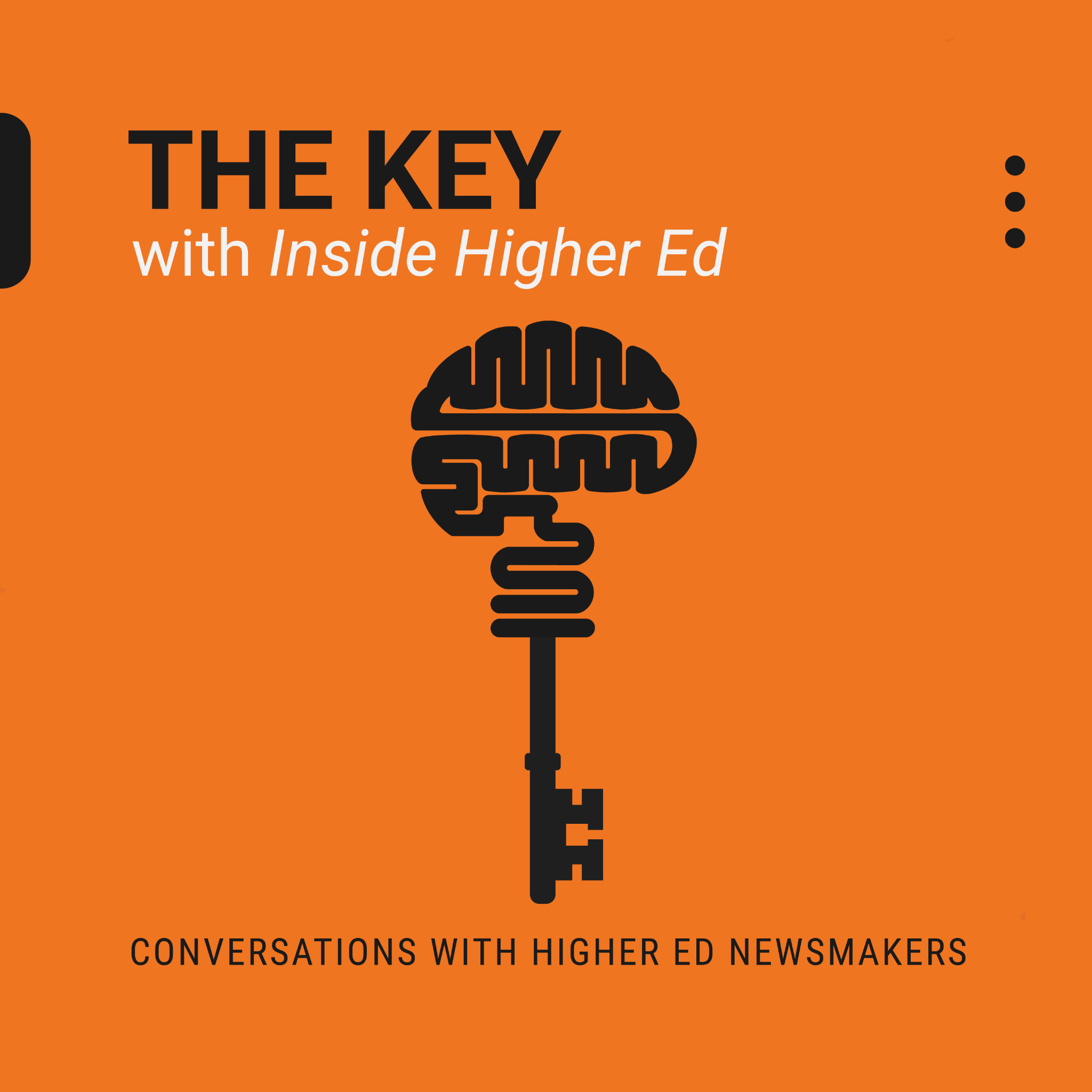Episodes

Thursday Nov 04, 2021
Ep 66: Enrollment Declines, No Free Community College: Higher Ed’s Rough Week
Thursday Nov 04, 2021
Thursday Nov 04, 2021
Are politicians and the public losing faith in higher education?
Last week delivered unwelcome news to colleges and universities. New data from the National Student Clearinghouse showed that college enrollments tumbled again this fall, with hundreds of thousands fewer students opting to start or continue their educations than even during the heart of the pandemic last fall.
And a scaled-back version of President Biden’s Build Back Better Act contained about $40 billion in new funds for colleges and their students -- barely a third of the previous iteration and missing key initiatives such as much-touted tuition-free community college.
This week’s episode features three thoughtful observers of the higher ed landscape on what these developments mean and why they matter. Tamara Hiler is director of education at Third Way, a center-left think tank in Washington. Robert Kelchen is professor and chair of education at the University of Tennessee at Knoxville. And Teresa Valerio Parrot is a principal at TVP Communications.
Hosted by Inside Higher Ed Co-founder and Editor Doug Lederman.
This episode is sponsored by Formstack.

Thursday Oct 28, 2021
Ep 65: Debating the Value of College Arts (and Other) Programs
Thursday Oct 28, 2021
Thursday Oct 28, 2021
Federal data now allow anyone who wishes to identify academic programs whose graduates on average earn more than enough to repay their student debt -- or don’t. As journalists and think tank analysts dissect the data, many of the programs whose graduates don’t earn enough to repay their debt prepare people for industries that don’t pay very well but that society values, such as teaching or the clergy.
Degrees in the arts are a particular target. In this week’s episode of The Key, New America’s Kevin Carey and Doug Dempster, former dean of the College of Fine Arts at the University of Texas at Austin, debate the wisdom of pursuing degrees in the arts and other low-paying fields, whether economic outcomes are the best way to judge the value of those programs, and the prospects for driving down the costs of those programs.

Thursday Oct 21, 2021
Ep 64: A Struggling College’s Plea for Help
Thursday Oct 21, 2021
Thursday Oct 21, 2021
“Time is growing short.” That’s how Bloomfield College’s president, Marcheta P. Evans, described the struggling private college’s situation this week in an atypical plea for help.
Bloomfield, whose students are overwhelmingly black, Hispanic and from low-income backgrounds, acknowledged that it won’t make it through the 2022-23 academic year in its current condition, and asked for help from potential philanthropists and partner institutions to keep its mission alive.
In this week’s episode, Marcheta Evans discusses the New Jersey college’s unexpected approach to an increasingly common plight. She explains why it chose to go public about a situation many institutions hide, and it’s options for surviving and even thriving.
This week’s other guest is Barbara Brittingham, president emerita of the New England Commission of Higher Education, who as leader of the accrediting body in the demographically challenged Northeast encountered more than her fair share of financially ailing institutions.
This episode is hosted by Inside Higher Ed Co-founder and Editor Doug Lederman.
Sponsor is Formstack

Wednesday Oct 13, 2021
Ep 63: We Are All Data People
Wednesday Oct 13, 2021
Wednesday Oct 13, 2021
Data is a four-letter word in some quarters of higher education, even as many people call for colleges and universities to get better at using data and analytics to support institutional decision-making. Plenty of academics equate discussions about “data” with an overemphasis on efficiency or productivity or accountability, and worry that college leaders will put algorithms and numbers ahead of thoughtful analysis.
Amelia Parnell strongly believes in the power of good information to help college faculty and staff members make better decisions. But in her new book, “You Are a Data Person: Strategies for Using Analytics on Campus,” from Stylus Publishing, Parnell describes a very expansive view of data-informed conversations that just about everyone in a campus community can and should be able to participate in.
Parnell, vice president for research and policy at NASPA–Student Affairs Administrators in Higher Education, joins this week’s episode of The Key for a conversation about the different ways that professors, administrators and staff members can use data in their everyday work and contribute to important discussions across the institution – whether they consider themselves “data people” or not.
Hosted by Inside Higher Ed Co-founder and Editor Doug Lederman.
This episode of The Key is sponsored by D2L.

Tuesday Oct 05, 2021
Ep 62: Amazon’s Approach to Employee Education and Training
Tuesday Oct 05, 2021
Tuesday Oct 05, 2021
This episode explores the retailer’s $1.2 billion investment in helping workers earn degrees -- and how it reflects the complicated, sometimes conflictual relationship between colleges and employers.
Last month Amazon announced a plan to spend $1.2 billion by 2025 to expand its employee education and training offerings, which include a set of internal programs but also cover the full cost of academic programs up to bachelor’s degrees for its front-line workers.
In this week’s episode of The Key, Amazon’s vice president for workforce development, Ardine Williams, discusses the company’s new investments as well as its relationship with colleges and universities, which she describes as more cooperative than competitive.
Williams also discusses the signals that employers like Amazon send about how they view the quality of traditional higher education programs and institutions and her views about the value of a liberal arts education.
Hosted by Inside Higher Ed Co-founder and Editor Doug Lederman.
This episode of The Key is sponsored by D2L.

Wednesday Sep 29, 2021
Ep 61: Putting Career Readiness at Higher Ed’s Core
Wednesday Sep 29, 2021
Wednesday Sep 29, 2021
Many employers and critics of higher education think many colleges and universities focus too little on ensuring that their graduates thrive after they leave, and favor holding institutions accountable for how their students fare in the job market. That’s unpalatable to a lot of academics, who view a college education as about more than how much you earn.
The guests in this week's episode, Wake Forest University’s Andy Chan and Christine Cruzvergara of Handshake, endorse the view that colleges and universities should be collecting and sharing data about how well they are preparing students for success in the workplace, given that that’s the primary reason many students go to college.
But the set of common metrics they propose colleges use to measure their own performance is broad, and it includes such data as how much institutions expose students to experiential learning in college to graduates’ satisfaction with their jobs once they leave.
Chan and Cruzvergara discuss the need for colleges to prioritize their students’ career readiness, and to move beyond tired debates pitting learning against vocation.
Hosted by Doug Lederman, co-editor of Inside Higher Ed
This episode is sponsored by D2L.

Thursday Sep 23, 2021
Ep 60: COVID’s Impact on the Return to Campus
Thursday Sep 23, 2021
Thursday Sep 23, 2021
Despite our expectations and hopes, here we are in another COVID fall. This week’s episode of The Key examines how the pandemic is affecting institutions, students and employees as most colleges and universities strive to keep their reopened campuses … open.
Elizabeth Redden, a senior reporter who has driven Inside Higher Ed’s coverage of the pandemic since its earliest days, joins The Key to discuss a wide range of issues:
- Enormous variation in how the coronavirus – and politics related to the pandemic -- are playing out in different parts of the country.
- How students are complying with their colleges’ vaccination mandates.
- What we know, and may not know, about the state of COVID infection on campuses.
Hosted by Inside Higher Ed Co-founder and Editor Doug Lederman.
This episode of The Key is sponsored by D2L.

Friday Sep 17, 2021
Ep 59: Reshaping the Federal Role in Higher Ed
Friday Sep 17, 2021
Friday Sep 17, 2021
The Biden administration has promised once-in-a-generation investments and changes in higher education. Legislation introduced in the House of Representatives this month would take meaningful steps in that direction.
This week’s episode of The Key digs into what could end up being one of the most significant pieces of federal higher education policy making in many years: the Build Back Better Act. It includes the American College Promise, his plan to make community college tuition-free, significantly expanded funding for Pell Grants, and, for the first time, a fund that would give colleges incentives for retaining their students and ensuring that they graduate. It would also reshape the relationship between federal and state governments, through a partnership that would give state governments billions but require a lot from them in return.
The episode includes conversations with Michele Streeter, associate director of Policy & Advocacy at the Institute for College Access and Success; Jee Hang Lee, senior vice president (and incoming president) at the Association of Community College Trustees; and Will Doyle, a professor of higher education at Vanderbilt University.
This episode is sponsored by D2L.

Wednesday Sep 08, 2021
Ep 58: Teaching and Learning in (Another) Fluid Fall
Wednesday Sep 08, 2021
Wednesday Sep 08, 2021
Most of us had hoped for a lot more stability this fall, but here we are. For those of you involved in teaching and learning at your colleges and universities, that means continuing to live in that sometimes uncomfortable space you’ve inhabited for the last 18 months: Will my class have to go remote tomorrow? Have I designed my course to withstand that kind of disruption? Can I be effective no matter what setting we’re in?
These may not be fleeting questions for institutions and instructors, as higher education deals with a new reality that whether it’s a global health pandemic, or hurricanes or forest fires, or any other kind of interruption or disruption, circumstances may require – and students may demand – flexibility in how and when academic instruction is delivered.
This week’s episode of The Key features a discussion with Jeff Borden, chief academic officer at D2L and executive director of Institute for Inter-Connected Education. The conversation examines how colleges are striving to balance and mix in-person and virtual modalities; the growing recognition of students’ non-cognitive as well as cognitive needs; and how the pandemic may have altered student and faculty expectations.
Sponsored by D2L

Thursday Aug 19, 2021
Ep. 57: Career and Technical Education Goes Hybrid
Thursday Aug 19, 2021
Thursday Aug 19, 2021
Much higher education coverage related to COVID-19 focused on 18-year-old students being displaced from their dorms and listening to history lectures or watching biology videos in their childhood bedrooms. Relatively little attention was paid to the pandemic’s impact on career and technical education, much of which involves hands-on learning.
In this week’s episode of The Key, Shayne Spaulding, a senior fellow in the income and benefits policy center at the Urban Institute, discusses research the think tank released this spring about how the pandemic may have changed the role of online and blended learning in community college career and technical programs. The conversation also explores the role of alternative providers in the CTE space and whether vocational learning is undervalued in American society.
This episode is hosted by Inside Higher Ed Editor Doug Lederman.
Sponsored by ECMC Foundation.

